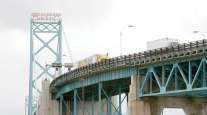NTTC Asks PHMSA to Withdraw Plan for Outsourcing Regulatory Requirements
This story appears in the Jan. 24 print edition of Transport Topics.
The National Tank Truck Carriers association has asked federal hazardous materials regulators to withdraw a plan to outsource regulatory requirements for the design, manufacture, test, inspection and repair of cargo tanks to a pair of professional organizations.
The proposal by the Pipeline and Hazardous Materials Safety Administration calls for incorporating the American Society of Mechanical Engineers code for the design, construction and maintenance of cargo tanks in lieu of the agency’s regulations.
In a letter to the agency, John Conley, president of NTTC, said that PHMSA’s plan would preclude tank-truck operators from participating in the usual rulemaking process and would be costly for carriers.
The agency also said it is considering incorporating the National Board of Boiler and Pressure Vessel Inspectors’ National Board Inspection Code as it applies to the “continuing qualification and maintenance of ASME stamped cargo tanks.”
The PHMSA proposal was made in response to an ASME suggestion in a 2005 petition that the agency “incorporate by reference” the group’s professional standards, essentially giving the organization’s standards the force of law. The boiler and pressure vessel inspectors made a similar offer in a 2007 petition, but PHMSA did not make its proposal public until Dec. 23.
“There are other, more equitable, ways of farming out regulation writing than this single nonbidder approach that ASME and the Na-tional Board petitioners hope to accomplish by PHMSA fiat,” NTTC’s Conley wrote.
“If the agency has concluded that it no longer can write regulations for the manufacture, operation, testing, repair and maintenance of cargo tanks, then it should develop a request for proposal and open the process up to the many public and private concerns that could review and present possible amendments,” Conley told PHMSA.
Under the proposal, carriers either would have to attend meetings of the two professional organizations to give their input, travel to Washington, D.C., to view the standards at the agency’s office, or purchase the standards from the professional organizations at a cost of roughly $600, Conley said.
A PHMSA spokeswoman disputed Conley’s contention and said the proposal, if adopted, still would require future regulatory changes to go through the normal process of being open to comment from the public and industry.
“This notice is an advance notice of proposed rulemaking,” said Julia Valentine, the PHMSA spokeswoman. “As such, at this time, we are only seeking input from industry and the public to determine what impact a rule like this might have. PHMSA believes these changes would enhance safety and promote technological advancement and economic growth.”
The two professional organizations did not respond to a request for comment by press time for Transport Topics.
Richard Moskowitz, vice president and regulatory affairs counsel for American Trucking Associations, agreed that the proposal would make it very difficult for tank-truck carriers to provide informed comment on regulatory changes that might affect the industry.
“We believe that ASME or any professional organization has the right to develop standards,” Moskowitz told TT. “But when they seek to have those standards be accorded the force of law, they should forfeit their copyright protections.”
Moskowitz agrees that the tank-truck carriers in effect would have to “pay to play.”
“[The U.S. Department of Transportation] has agreed to make one copy of the ASME standard available at its headquarters,” Moskowitz said. “That’s very different than publishing in the Federal Register a copy of the standard and allowing affected parties to comment.”
Conley said that he understands why PHMSA might wish to “farm out” the task of writing the regulations.
“PHMSA continues to be given more and more responsibility without being provided the resources it needs,” Conley wrote in a separate letter to National Transportation Safety Board Chairman Deborah Hersman. “PHMSA has a need for qualified engineers and the federal pay level to attract engineers to the Washington, D.C., area with its high cost of living puts the agency at a disadvantage.”
“I do believe, though, that there are options to this Draconian solution that essentially removes the regulated public from the process,” Conley wrote.
Conley said if PHMSA plans to turn over the regulatory requirements to a private entity, it should put the idea out for public bid. “I am very confident that private companies such as Battelle or SAIC or universities such as the University of Michigan and Virginia Tech would be interested in bidding on this work,” Conley wrote.
“It’s a gold mine for ASME and for the national board,” Conley told TT. “I’ve told PHMSA I will fight you at the agency, I’m going to fight you on the [Capitol] Hill, and I’m going to fight you in the courts.”


